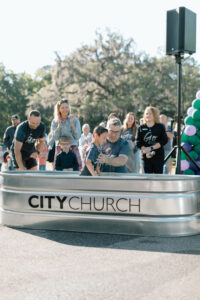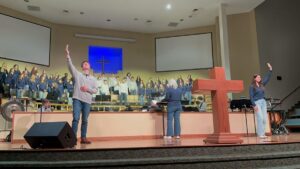
WILMORE, Ky. (BP)–Is the Baptist Faith and Message being contradicted by Baptist church rolls? That’s the question Tom Ascol posed during the 2001 Southern Baptist Founders Conference, July 17-20 at Asbury College in Wilmore, Ky.
Ascol, pastor of Grace Baptist Church in Cape Coral, Fla., pointed to the 2000 Baptist Faith and Message as continuing the historic Baptist commitment to regenerate church membership. In practice, however, the denomination reflects a wholesale departure from it, he said, citing a North American Mission Board study indicating trouble at this crucial point of biblical doctrine, as well as church membership rosters filled with the names of “inactive” or missing members.
The doctrine of regenerate church membership holds that only born-again persons may be members of a local church. It is a historic Baptist distinctive, championed by all the historic Baptist confessions of faith, including the 1925, 1963 and 2000 statements of the Baptist Faith and Message.
“Our practice doesn’t measure up to our confession,” Ascol said. “The overwhelming majority of Southern Baptist church members give little or no sign of spiritual life. There are countless studies that have been done in the past 15 years that validate this.”
As evidence of this jettisoning of regenerate church membership, Ascol cited figures from the SBC’s 2000 church profile and a study conducted by the North American Missions Board which showed that:
— SBC churches totaled 15.9 million members but only 5.5 million in total attendance on any given Sunday morning. “Only 33 percent of those who are supposed to be members care enough to come,” Ascol said.
— The typical SBC church has 233 members but an average attendance of only 70 persons for Sunday morning worship.
— Beyond Sunday morning, only one member in 10 takes part in further church activities.
— Less than one of every 10 persons who make decisions through the evangelistic efforts of Southern Baptist churches is active in the church one year later.
Ascol called such membership statistics a “sham” and “an affront to God.”
Baptists have assumed for so long that they understood the meaning of the word “church,” yet scores of Baptists, even pastors, are hard-pressed now to define the word, Ascol asserted.
“At the heart of our Baptist understanding of the nature of the church is the principle that says church members must be born again. The belief in a regenerate church membership is one of the foremost ecclesiological distinctives in the history of Baptists,” Ascol said, pointing to confessions of faith reaching back to the first generations of Particular and General Baptists, to the Anabaptists and even to a minority faction within the Westminster Assembly.
Still, the more critical test of regenerate church membership is its biblical fidelity, Ascol said. He noted that the Baptist commitment to believers’ baptism is built on biblical arguments for a believers’ church against the objections of those who would baptize infants.
Ascol quoted an array of passages from the New Testament, all of which address the church as “children of God by faith,” “saints in Christ Jesus” or similar terminology. He cited Luke’s comment in Acts 2 that “the Lord added to the church daily those who were being saved.”
“The churches of the New Testament were comprised of believers and we don’t have any evidence that suggests otherwise,” Ascol said.
The recent departure from this biblical view on the part of many SBC churches has pulled along with it an entire train of residual problems, Ascol said, mentioning a recent incident when two fellow pastors were fired for attempting to deal with the question of non-attenders whose names remained on the membership rolls.
“Filled with baptized, yet unregenerate members, they begin to take on the appetites, the ideals, the methods of the unregenerate in dealing with ecclesiological issues,” Ascol said. “When a pastor in such a situation tries to recover some long-neglected truth or practice, there is war.”
The war commences with a business meeting and packed pews, filled with persons who have not attended the church in years, Ascol said. It ends with the pastor’s firing, largely at the hands of “church members” who are members in good standing yet live worldly lives and never darken the doors of the church.
“This type of wicked venting of godless actions and attitudes that is going on across our denomination could not happen in a local church that takes seriously a commitment to regenerate church membership,” Ascol said. “I know regenerate people have sin that remain in us. But where this is taken seriously and applied, you won’t have the sudden influx of dozens or maybe hundreds of members to show up at a business meeting who haven’t been there in the last five years.”
Two crucial doctrines naturally accompany regenerate church membership, Ascol said: believer’s baptism and biblical church discipline. The two are practiced as an extension of regenerate church membership to protect the purity of the church.
Ascol pointed out that Baptists historically have required a candidate to demonstrate two qualifications to be considered for entrance into the church: a credible demonstration of commitment to a new and holy life and believer’s baptism.
Said Ascol, “When Baptists insist on maintaining what they call a practice of ‘believers baptism,’ while neglecting the necessity of regenerate church membership, they fall into a trap that is worse than the temptations and errors of paedobaptism.”
To return purity and true unity to the life of Southern Baptist churches, Ascol called for a recovery of the doctrine of regenerate church membership along with church discipline — two marks missing from the contemporary SBC church. Christ’s command to carry out church discipline, along with the method, is unambiguous in his words in Matt. 18:15-30, Ascol said.
“A church is a holy communion,” he said. “It is to be comprised of saints, holy people. That is why none but the regenerate are qualified to be members. A local church has the responsibility to encourage holiness in its membership and discourage unholiness. And for this purpose, God’s Word gives us very clear, and in some regards, very simple instructions regarding discipline.”
–30–













